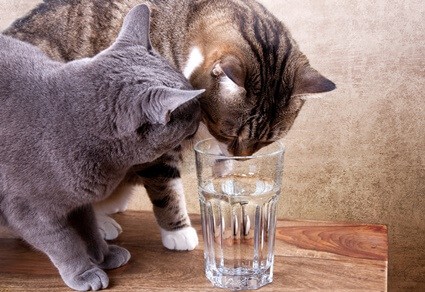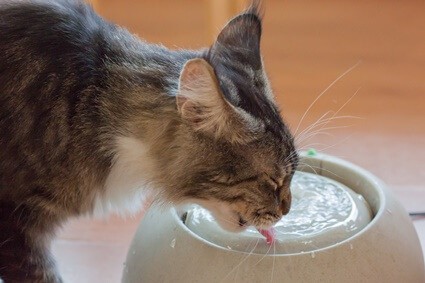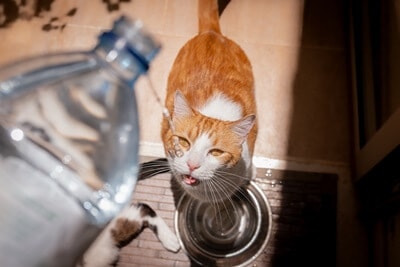Convincing a cat to drink enough water each day isn’t always easy. A distaste for tap water amplifies this problem, leaving you wondering if bottled spring water is a better option. Purchasing bottles of Evian water for cats may seem excessive, but it can sometimes be necessary to ensure that your cat stays hydrated.
If water is bottled fresh from a spring, it’s healthier for cats to drink. Plastic bottles can contain chemicals and toxins that leech into the water. So, find a bottle that’s made from polyethylene terephthalate (PET), or give your cat spring water from a glass or cardboard carton.
There are alternative hydration options for cats. You could get in a purifier and offer your cat filtered water, or you could distill water at home. You need to ensure that your cat drinks enough water each day to stay healthy.
Is Mineral Water Safe for Cats?
Premium bottled water from a natural source is ideal for cats. You can easily taste the difference between tap water and mineral water, and your cat will be able to tell these water sources apart.
If you buy natural spring water, your cat will enjoy hydration that’s free from the chemicals found in tap water. This reduces the likelihood of your cat walking away immediately after sniffing the water.
Choosing the Right Mineral Water
Mineral water may be preferable to water from a tap, but it’s not ideal. As mentioned, not all mineral water is of the same quality. Unless you’re buying a trusted brand, focus on improving the quality of tap water.
Another concern is bisphenol A (BPA), which is a chemical found in plastic water bottles. As per Environmental Science and Technology, BPA has been linked to certain mutations and health concerns in animals and humans.
While some of these concerns are countered, and misinformation is unhelpful, many experts still advise against using plastics constructed from this material. When inspecting a plastic bottle, check the label for a recycling logo with a number inside. This is called a resin identification code.
The American Chemistry Council recommends plastics with the number 1. This denotes that the bottle is constructed from polyethylene terephthalate (PET), which is deemed safe.
Alternatively, get water housed in glass or cardboard.
Sparkling Mineral Water
The bubbles generated in carbonated water are more interesting to a cat than water that’s completely still, which may tempt a cat to drink.
Alas, sparkling water isn’t recommended for cats as a regular refreshment. This water can result in stomach bloating, especially when lapped up in large quantities.
Sparkling water is good for entertaining cats as most will stare at the bubbles for hours.
Flavored Spring Water
Another bottled water that may tempt a reluctant cat is a flavored option, like strawberry or watermelon. If your cat avoids plain water but loves the smell of fruit, it may show more interest in drinking.
Avoid flavored water as these fluids are high in sugar. Others include artificial sweeteners, such as xylitol. The Journal of Veterinary Pharmacology and Therapeutics has said that cats don’t experience toxicity from xylitol. However, it offers nothing positive and may deter hydration. Cats are drawn to the scent of fruit but cannot taste sweetness.
That’s not to say that you can’t flavor the water yourself. Infusing tap water with the essence of fruit may tempt cats into drinking. The smell will pique interest and mask any existing aromas of copper and chlorine.
Avoid making fruit-infused water a default selection. If cats grow used to this scent, they’ll be even less inclined to hydrate with plain water, even in an emergency.
What’s more, fruit-infused water can be sticky. Cats are clean drinkers, minimizing waste and spillage. Flavored water can stick to a cat’s muzzle, and the sweetness may attract flies.
Why Won’t My Cat Drink Tap Water?
Domesticated cats have an innate distrust of still water. In the wild, cats drink from streams, ensuring a moving water source. This is why many cats show a strange desire to drink from the toilet.
There could be another explanation why your cat refuses tap water. Before spending money on mineral water, consider if any of the following reasons rationalize the refusal to hydrate:
Dirty or Stagnant Water
As discussed, cats are only interested in clean, pure water. This means that anything that has been laid down for longer than an hour could be deemed dirty or stagnant.
Cats are curious animals, and some may consider pungent aromas to make water more interesting. It’s more likely that the cat will express no interest in the water, though.
This becomes increasingly likely if another cat has used the bowl.

Smell of Treatment Chemicals
Cats have a sense of smell that’s up to 16 times stronger than humans.
While this can be beneficial while hunting, it’s detrimental to the enjoyment of tap water. Cats can smell every chemical used by the local water company to keep the liquid safe for consumption.
Tap water will often be treated with the following chemicals:
- Liquified chlorine
- Sodium silicofluoride
- Aluminium sulphate
- Fluorosilicic acid
- Calcium hydroxide
The aromas generated by these additions will deter most cats from drinking. If your cat approaches its water bowl, sniffs, and walks away, this is why.
Purifying, distilling or filtering water resolves this issue.
Close Proximity to Food or Litter
This sensitivity to the smell of water could apply to location.
You should never place a cat’s food and water bowls side by side. To a feline, the scent of food contaminates any liquid. The same also applies to litter boxes. Serve fresh tap water and relocate the bowl to another part of the home.
Keep nourishment and hydration as entirely separate entities. Cats rarely drink immediately after eating, and even if they do, they prefer walking to a different location.
Is Hard Water Bad for Cats?
Avoid the consumption of hard water. Water is deemed ‘hard’ when it contains dissolved calcium, magnesium, lime, and chalk. If these dissolved minerals total more than 1 grain per gallon of water, it’s considered hard water.
Almost every territory of the U.S. has hard water, and soft water is undrinkable due to its high sodium content. A sliding hardness scale is measured by grains per gallon (GPG).
This table explains the impact of GPG:
| Grains Per Gallon | Water Hardness |
|---|---|
| 1 – 2 | Slightly hard |
| 3 – 6 | Moderately hard |
| 7 – 9 | Hard |
| 10 – 13 | Very hard |
| 14 + | Extremely hard |
Extremely hard water is linked to feline urinary issues. If you’re unsure of the water quality in your local area, ask your supplier for further information.
Does a Purifier Make Tap Water Safe?
An alternative to spring water is purified water. That way, you can make tap water as safe as store-bought water. This is advisable if you live in one of Best Life’s cities with the worst drinking water.
A water purifier softens hard water and removes any harmful chemicals. This makes your cat more likely to drink as the aroma is removed from the water ahead of serving.

Can Tap Water be Distilled?
If you don’t want to get a water purifier, consider distilling water instead.
Distillation is the process of removing any impurities from water through boiling. The water is turned to vapor, captured, and condensed back into liquid form.
If you want to prepare distilled water for your cat, follow these instructions:
- Empty tap water into a large pot on a stove
- Place a smaller pot inside this larger vessel
- Turn up the stove heat to 200 degrees Fahrenheit
- Place an inverted lid on the large pot to trap steam
- Add ice to the lid to speed up condensation
- Wait for the steam to turn back to water and drip it into the small pot
Distilling water is effective but can be time-consuming. If you’re looking for a faster solution, use a water purifier.
Find a way to keep your cat hydrated as they won’t survive for more than 3-4 days without water.

